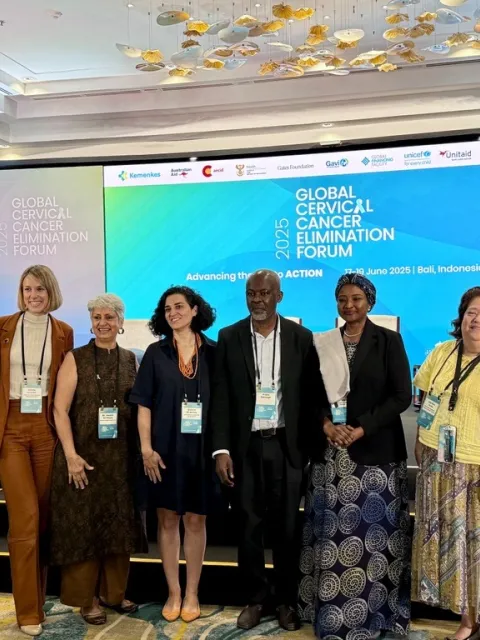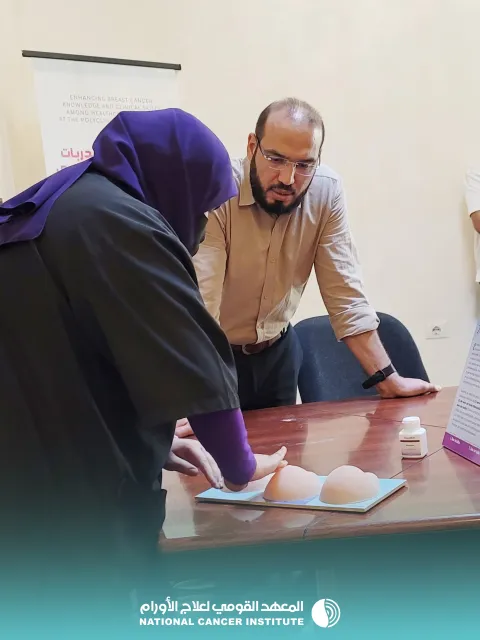Successfully reaching out to women in Afghanistan about cancer
Musa Shukoor from the Afghanistan National Cancer Control Program spoke to UICC about how the organisation is reaching out to women and about the need for greater resources to treat cancer in the country.

A quarter of women globally are are not able to make their own decisions about accessing health care, according to a 2020 report by the United Nations Population Fund based on data from 57 countries.
Indeed, cultural or religious norms that prevent certain populations from benefitting from health services even where they existed in their region are among some of the barriers highlighted by the World Cancer Day 2022-2024 “Close the care gap” campaign.
Musa Shukoor, Senior Communication Officer, National Cancer Control Program, Ministry of Public Health, Afghanistan
Musa Shukoor, Senior Communication Officer for the National Cancer Control Program (NCCP) of the Ministry of Health in Afghanistan, as well as Founder and Director General of Afghanistan Non-Communicable Disease (NCD) Alliance, both UICC member organisations part of the Cancer Advocates programme, spoke to UICC about how these significant barriers to care can be overcome.
Breast cancer is the most commonly diagnosed cancer in Afghanistan and the second most likely to result in death after stomach cancer, according to Globocan 2020. Some 3,173 new cases were reported in 2020, while 1,783 women lost their lives to the disease. A primary reason – in addition to a severe lack of resources – is that women in Afghanistan are overwhelmingly presenting when the disease is already at an advanced stage.
“We ask women why they did not come for treatment earlier, when they first noticed changes in the breast. They tell us they detected a mass or lump but that they could not talk to their husband or father about it due to stigma. When it became more severe and they spoke about it, their husband or father would go to a medical store to get them an antibiotic or a cream. It’s only when the man realised that it is not going away and the breast is completely changed then they decide that the woman could see the doctor.”
– Musa Shukoor, MPH, Senior Communication Officer, National Cancer Control Program, Ministry of Public Health, and Founder and General Director of Afghanistan National NCD Alliance Kabul, Afghanistan
During Breast Cancer Awareness Month in October, the Afghanistan NCD Alliance, in collaboration with the Afghanistan NCCP and the Afghanistan Society of Obstetrician and Gynaecologists, conducted awareness campaigns about breast cancer and trained participants on how to conduct self-examinations.
A total of five campaigns were organised. Two were aimed at increasing the medical knowledge of health workers in prevention, early detection, treatment, palliative care and self-examination in two maternity hospitals in Kabul.
The other three campaigns were designed to reach out to women where the organisation was able to interact with them – at Ghalib, Dawat and Khatam-Al-Nabieen universities in Kabul.
“While women are now banned from schools, those who were at university before 2021 are allowed to continue their education and to attend campaigns that are formally organised in collaboration with the Ministry of Health, but on separate days – even days for women and odd days for men. We could meet with them there, while other public areas are not easily accessible to us and sometimes impossible to reach, such as public parks, which are also open on separate days for men and women. While it is also essential to conduct such campaigns in rural areas and provinces, where people’s awareness and knowledge of cancer are extremely low and stigma surrounding breast cancer is much higher. But we were not able to do that due to lack of resources.”
– Musa Shukoor
In these campaigns, the National Cancer Control programme provided women with guidelines on breast health education and a notebook with messages on prevention, so they could share them with friends and family.
There were designed and printed before August 2021. Currently the NCCP does not have the budget for new infographics, posters or other printed materials. “Even when our team is conducting these campaigns we do not have any transportation and have to pay from our own pocket,” says Mr Shukoor.
Students were from different provinces and not just from Kabul and women overall have been very receptive to the outreach. “They are very happy and welcoming,” says Mr Shukoor. “They say they want to join us in more campaigns and help us, since we are helping them.”
The awareness campaigns also targeted men so that they could respond more effectively to women’s needs.
“We are trying to make it clear to everyone that cancer must not be stigmatised. We say to men, ‘listen carefully to a woman who talks about a sign of cancer, don’t go the pharmacy for medication. Help your wife or daughter to identify cancer in the early stages so you can help save her life.’”
– Musa Shukoor
Mr Shukoor has also been coordinating outreach activities on human papillomavirus (HPV) vaccination but this has also been challenging due to misconceptions and false information about vaccines in general.
“Many don’t want to vaccinate their children against polio, let alone HPV. This problem of misinformation and myths surrounding vaccines and medicines is not only in rural areas. In Kabul, for instance, UNICEF along with the nutrition department at the Ministry of Health distributed iron tablets in schools but some did not wish to take them due to false information stating that they caused infertility.”
– Musa Shukoor
Mr Shukoor says public authorities understand that women have rights, that breast cancer and other cancers need to be addressed. He adds, however, that there are other political considerations.”
Mr Shukoor started working with the Ministry of Health in 2017 when the first project for cancer diagnosis and treatment began. A year later, this project became the National Cancer Control Program focus and expanded to include data registry, prevention, early detection and palliative care.
“When the government collapsed in August 2021, the NCCP and other departments of the Ministry of Health that were project-based faced many challenges in delivering their services. Some were stopped completely, such as cancer registry, communication and palliative care. Slowly, by October, activities started up again, but the number of staff had dropped from about 150 to 70."
– Musa Shukoor
Currently, there is only one dedicated cancer ward in Afghanistan – for a population of nearly 40 million – located in Kabul at Jamhuriat Hospital. It provides prevention, screening, chemotherapy, surgical oncology and palliative care – but with only 30 medical oncology beds, 30 surgical oncology beds and 30 day care beds, and many people sleeping in the corridors waiting weeks for an available bed. Two regional hospitals in Mazar-e Sharif and Herat provide treatment but no screening or palliative care. Radiotherapy is not available anywhere in Afghanistan. Those that can do so travel to Pakistan for treatment.
Mr Shukoor says that staff is back up to about 100 people, with the International Committee of the Red Cross supporting the hospital and paying for services and doctors. “But 100 people cannot answer all the requirements of the NCCP,” he says.
As the original cancer control plan expired this year, the Ministry of Health is working with a technical team from the World Health Organization to develop a new framework. “We are waiting for the government to finalise a general public health strategy for ministry of health then we will be able to develop new strategy for the NCCP and non-communicable diseases,” says Mr Shukoor.
“The objectives of the original national cancer control strategy remain but resources are lacking. And international support has disappeared. The International Atomic Energy Agency was going to start a radiotherapy centre and we were working on that before 2021, but now the project has completely stopped. The Ministry of Health and Higher Education is now trying to approach the IAEA to resume the project, but from other countries there is nothing.”
– Mr Musa Shukoor
Last update
Friday 24 March 2023
